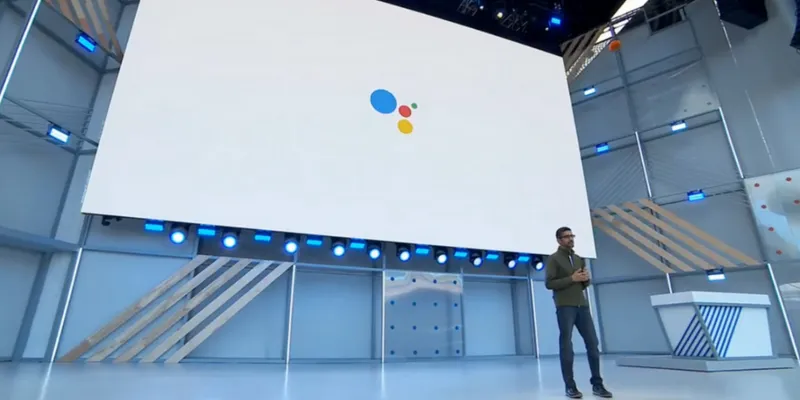An AI-driven future, revamped apps, and more: highlights from Day 1 of Google I/O
Google I/O, the annual developer conference hosted by tech giant Google, returns to Mountain View, California, this year in its 11th edition. Taking place on May 8-10 this year, I/O is Google’s annual push for the company’s latest tech innovations with technical in-depth sessions focused on building web, mobile, and enterprise applications with Google and open sources such as Android, Chrome and Chrome OS, APIs, Google Web Toolkit, App Engine, and more. The current edition has already seen some major announcements and reveals on its first day, from a major push for Artificial Intelligence (AI) across all of Google’s software products to long-awaited updates like the public beta launch of Android P. Here are some of the biggest developments from Day 1 of Google I/O:

AI all the way
Just before its keynote kicked off the conference, Google announced that it was rebranding its research division from Google Research to Google AI. This is a pretty clear indication of the company’s planned focus area in the years to come, and Google showcased exactly how much it is banking on AI driving its software products in the future. AI is now powering applications from Google Assistant to Google Maps and more, and it’s clear that the company has big plans to drive R&D and applications in computer vision, natural language processing, neural networks, and machine learning.
Android P – bold, ambitious, and finally in public beta
Android P is the ninth version of Google’s hugely popular mobile operating system and was announced in March this year, with a developer preview released on the same day. At I/O, attendees finally got to see the platform in action, with a host of ambitious new features and updates, including AI-powered adaptive battery and brightness monitoring to improve battery life, App Actions that will help the OS predict interactions in advance to give a more seamless user experience, iPhone X-like gesture and vertical control to enable new system navigation for multitasking and one-handed use, a new “digital wellbeing” Dashboard that will tell you “how you’re spending time on your device, including time spent in apps, how many times you’ve unlocked your phone, and how many notifications you’ve received” to help people monitor phone usage more effectively, and more.
The update is expected to officially roll out to the public later this year, but a beta version is now available on certain devices from Google, Essential, Sony, Nokia, and more.
Google Assistant is now more helpful than ever
Google Assistant is almost two years old now, and Google’s competitor in the voice assistant space has come a long way from its origins. While Google has steadily pushed for greater integration of Assistant in more and more products and appliances, I/O saw the product really take centre-stage, with a slew of related announcements: six new voices (including John Legend. Seriously.), the ability to have Continued Conversations and undertake Multiple Actions so that users have a more seamless experience while using Google Assistant, a new feature called Pretty Please that will allow Assistant to recognise and encourage polite conversation, as well as Custom Routines, that will allow users to create custom task-lists for individual commands (say “Hey Google, dinner’s ready”, and the Assistant can turn on your favourite music, turn off the TV, and broadcast “dinner time!” to everyone in the house).
Google Assistant will also now be powered by updated AI technology called Google Duplex that will help the platform better understand human speech patterns as well as replicate human conversation in real-world applications as seamlessly as possible. In one of the more jaw-dropping moments at Google I/O, Google CEO Sundar Pichai demonstrated a phone call by Assistant to make a booking at a hair salon; the conversation felt like two humans talking, with no hint that one of the speakers was an AI platform. Duplex will help Google Assistant become more “human” than ever before and could pave the way for truly seamless human-AI interactions in the future.
Google’s next-gen enhanced apps are here
Google also revealed a plethora of updates to its various applications and software products, including greater integration of Google Maps with phone cameras, computer vision, and Street View to give users a new turn-by-turn navigation experience; Smart Compose in Gmail that will bring Google’s Autocomplete experience to email, making composing emails faster than ever before; the ability to edit and “fix” photos in real-time simply through one-touch interactions on Google Photos; a complete overhaul of Google News that will see real-time AI/ML capabilities merge with human curation and oversight to give users a more informative and personalised experience than ever before; and, the arrival of Google Lens to camera apps on several non-Google phones, along with smart text selection to let users copy and paste text from the real-world on their devices and real-time recognition of real world environments.
Under Sundar Pichai, Google has steadily shifted its focus to software, and this year’s Google I/O reflects that. Day 1 of I/O saw a huge amount of new reveals from one of the world’s most innovative tech firms, and it will be exciting to see what else Google reveals over the remaining two days of the conference.







![[Startup Bharat] How a 23-year-old entrepreneur built a 2G-based food delivery business in Kashmir](https://images.yourstory.com/cs/2/dc9aa1302d6c11e9aa979329348d4c3e/Gatoes-1628669312070.png?mode=crop&crop=faces&ar=1%3A1&format=auto&w=1920&q=75)